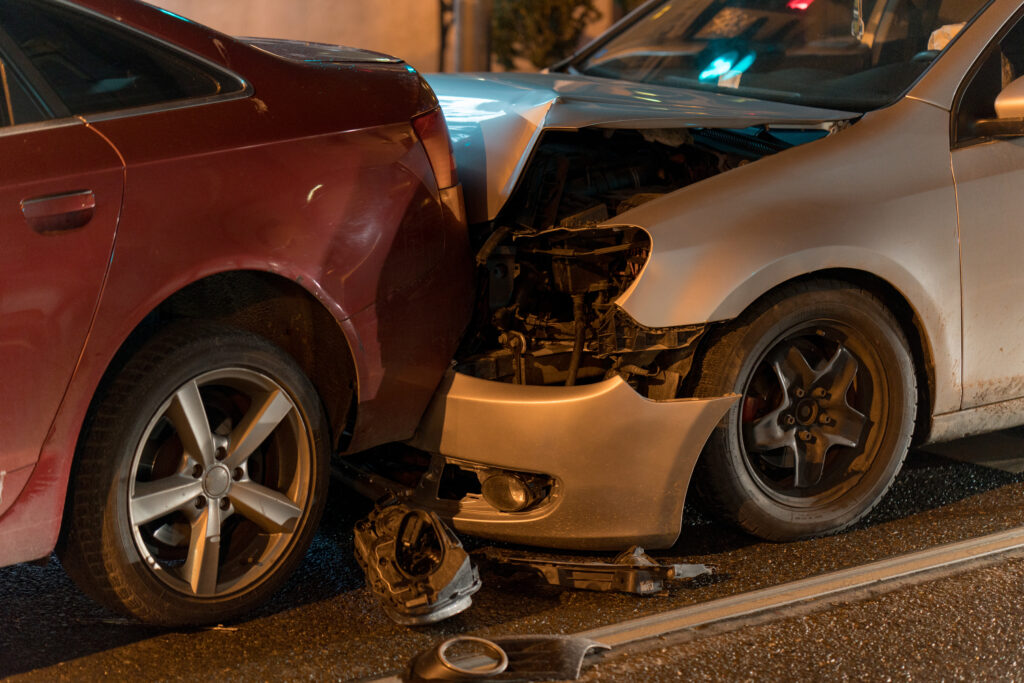Car accidents are rarely straightforward, especially when the fault is shared. If you've been involved in a collision in Dallas and suspect you might carry some responsibility, it's natural to feel uncertain about your next steps.

Texas law doesn't automatically disqualify you from seeking compensation just because you're partially at fault. Instead, the amount you can recover depends on the degree of your responsibility for the accident. This nuanced approach to liability means that even if you share the blame, you still have legal options to pursue damages for your injuries, property damage, and other losses.
Understanding how fault impacts your claim is critical, and that's where a Dallas car accident lawyer can make a difference. They'll assess your situation, protect your rights, and fight for the compensation you deserve. Whether dealing with insurance adjusters or presenting evidence to minimize your share of fault, having legal support can shift the balance in your favor. Let's explore the complexities of shared fault in Dallas car accidents and what it means for your claim.
Schedule A Free Case Consultation
The Legal Framework for Partial Fault in Texas
Texas law adopts a fault-based system for car accidents, meaning the driver responsible for causing the accident is liable for damages. However, when multiple parties share responsibility, the legal concept of modified fault allocation comes into play. Under state law, you can still recover compensation if you're partially at fault, provided your level of responsibility doesn't exceed 50 percent. This principle, often called the "51 percent bar rule," ensures that individuals who bear most of the blame can't seek damages from others involved.
For example, if you're found to be 30 percent at fault for a collision and your total damages amount to $100,000, your compensation will be reduced by 30 percent. In this scenario, you'd be eligible to recover $70,000. However, if your fault exceeds 50 percent, you lose the right to recover any compensation. This proportional reduction can significantly impact your financial recovery, making it essential to understand how fault is determined and contested in Dallas car accidents.
The Impact of Partial Fault on Compensation
Being partially at fault doesn't mean you're barred from receiving compensation, but it does mean your financial recovery will be reduced. This reduction can have far-reaching consequences, especially if you've sustained significant injuries or property damage. Medical bills, lost income, and repair costs can quickly add up, making every dollar of compensation critical.
Insurance companies often exploit the concept of shared fault to minimize payouts. They may argue that you bear more responsibility than you actually do, thereby reducing their liability. For example, if an insurer claims you're 40 percent at fault instead of 20 percent, your compensation would be reduced by an additional 20 percent. A skilled attorney will challenge these assertions, presenting evidence to lower your fault percentage and maximize your recovery.
It's also important to consider how partial fault affects non-economic damages, such as pain and suffering. These damages are subjective and harder to quantify, making them a frequent target for reduction by insurance adjusters. A Dallas car accident lawyer will advocate for a fair valuation of your non-economic losses, ensuring your partial fault doesn't unfairly diminish your compensation.
How Fault is Determined in Dallas Car Accidents
Determining fault in a car accident is a meticulous process that relies on evidence, witness accounts, and legal analysis. Law enforcement officers, insurance adjusters, and attorneys play pivotal roles in assessing liability. Police reports often serve as foundational evidence detailing traffic violations, road conditions, and witness statements. These reports may indicate whether one or more drivers violated traffic laws, such as running a red light or failing to yield.
Eyewitness testimony is another critical factor. Witnesses can provide an unbiased account of the events leading up to the crash, shedding light on actions like speeding or distracted driving. In addition, physical evidence such as skid marks, vehicle damage, and surveillance footage can help reconstruct the accident. A Dallas car accident attorney will analyze these elements to argue for a fair allocation of fault, potentially reducing your percentage of responsibility.
In some cases, accident reconstruction experts may be brought in to provide a detailed analysis of how the collision occurred. Their findings can be instrumental in challenging an insurance company's determination of fault, especially if you believe your share of responsibility has been overstated.
Common Scenarios Involving Shared Fault

Certain types of accidents frequently result in shared fault determinations. For instance, rear-end collisions are often presumed to be the fault of the driver in the rear, but exceptions exist. If the driver in front suddenly slams on the brakes without cause or has malfunctioning brake lights, they may share some responsibility. Similarly, both drivers may be partially at fault in intersection accidents if one ran a stop sign while the other was speeding.
Lane-change accidents are another common scenario. If two drivers attempt to merge into the same lane simultaneously, the fault may be split between them. In these cases, determining the exact percentage of fault can be contentious, as both parties may argue the other acted negligently.
Pedestrian accidents can also involve shared fault. While drivers are expected to exercise caution around pedestrians, a pedestrian who jaywalks or crosses against a traffic signal may bear some of the blame. A Dallas car accident lawyer will scrutinize the circumstances of the accident to argue for a fair distribution of fault, ensuring you're not unfairly penalized.
Why Legal Representation is Crucial in Shared-Fault Cases
The stakes are high when you're partially at fault for a car accident. Insurance companies are adept at leveraging shared fault laws to their advantage, often pressuring claimants into accepting reduced settlements. You may struggle to contest their findings or negotiate a fair settlement without legal representation.
Evidence Collection to Strengthen Your Case
Evidence is the foundation of any successful car accident claim, and it becomes even more critical when partial fault is involved. A Dallas car accident attorney will gather and analyze all available evidence to build a strong case in your favor. This process often begins with obtaining the police report, which can provide key details about traffic violations, road conditions, and witness accounts.
Your attorney will also collect physical evidence from the accident scene, such as photographs of vehicle damage, skid marks, and debris. These elements can help reconstruct the events leading up to the crash, demonstrating that your actions were not the primary cause of the accident. For example, if another driver ran a red light but you were cited for speeding, the evidence might show that the other driver's violation was the more significant factor.
In cases where fault is heavily disputed, your lawyer may consult accident reconstruction professionals to provide a detailed collision analysis. Their findings can clarify the sequence of events and establish a more accurate allocation of fault. This proactive approach can counter attempts by the opposing party to shift undue blame onto you, protecting your right to compensation.
Fault and Settlement Negotiations
Fault plays a critical role in settlement negotiations, often serving as the primary point of contention between parties. If you're found partially at fault, the opposing party's attorney or insurer will likely use this as leverage to offer a lower settlement. For instance, if your damages total $100,000 and you're deemed 30 percent at fault, they might offer $60,000 instead of the $70,000 you're entitled to, hoping you'll accept the reduced amount to avoid further delays.
A Dallas car accident attorney will counter these tactics by presenting a strong case for a fair settlement. They'll use evidence to challenge inflated fault percentages and negotiate for a compensation amount that accurately reflects your losses. If negotiations fail, they'll be prepared to take your case to court, where a judge or jury will determine fault and damages.
How Shared Fault Affects Courtroom Strategies
If your case goes to trial, fault will be a central issue. The opposing party will likely argue that you bear a significant share of responsibility, using this as a basis to reduce or eliminate your compensation. They might present evidence like witness testimony or accident reconstructions to support their claims. A Dallas car accident lawyer will counter these arguments by highlighting inconsistencies in the opposing party's evidence and presenting a compelling narrative of your version of events.
Jury perception also plays a role in fault determinations. Factors like the severity of the accident or the demeanor of the parties involved may influence jurors. Your attorney will work to present you in the best possible light, emphasizing your credibility and the strength of your case. This approach can sway the jury's opinion, leading to a more favorable fault allocation and higher compensation.
If the court rules in your favor, your attorney will ensure the judgment is enforced and that you receive the compensation awarded. They'll also handle any appeals or post-trial motions if necessary, protecting your interests throughout the legal process. By providing skilled representation in court, your lawyer will give you the best chance of achieving a favorable outcome.
The Long-Term Consequences of Partial Fault
Partial fault doesn't just affect your immediate compensation; it can also have the following long-term implications.
Increased Insurance Premiums
Insurers see at-fault drivers as a greater risk, even if you only share a small percentage of the blame. They adjust premiums accordingly, often leading to costly increases that last for years. Contesting any unjust fault determination is necessary to keeping your rates manageable.
Impact on Future Claims
A shared fault finding can also complicate future accident claims. If you're involved in another collision, the other party may try to use your prior fault as proof of a pattern of negligence. While this argument doesn't always carry legal weight, it can still influence negotiations and legal proceedings. Keeping your fault percentage as low as possible protects you from unfair assumptions in future cases.
A Dallas Car Accident Lawyer Can Help You Avoid These Problems
A Dallas car accident attorney will work to reduce the long-term consequences of partial fault. By challenging unfair blame and advocating for an accurate fault allocation, an attorney helps safeguard your financial and legal interests. Taking action early prevents excessive insurance hikes and minimizes the risk of complications in future claims.
Steps to Protect Your Rights After a Shared-Fault Accident

Protecting your rights after a shared-fault accident begins with understanding your legal options. Consulting a Dallas car accident lawyer is a critical first step. They'll evaluate your case, explain how fault laws apply, and outline a strategy for pursuing compensation. Their guidance can make the difference between a reduced settlement and a fair financial recovery.
Avoid making statements to insurance adjusters without consulting your attorney. Insurers often use claimants' words against them, twisting statements to assign a higher percentage of fault. Your attorney will handle all communications with the insurance company, ensuring your interests are represented effectively.
Documenting your injuries and damages is also essential. Medical records, repair estimates, and accident scene photographs can serve as valuable evidence in your case. Your lawyer will use this documentation to counter the insurer's claims and argue for a fair allocation of fault.
By taking these steps and working with a skilled attorney, you can protect your rights and pursue the compensation you deserve, even if you're partially at fault for a car accident.
Let a Dallas Car Accident Attorney Help Keep You From Shouldering Too Much of the Blame
Hiring a Dallas personal injury lawyer when you're partially at fault for a car accident is not just about securing compensation – it's about protecting your rights, financial stability, and future. From challenging insurance companies to presenting a strong case in court, your attorney will be your advocate every step of the way. With their guidance, you'll be better equipped to face the legal challenges ahead and achieve the best possible outcome for your case.
Contact an attorney as soon as possible for a free case review. Your lawyer will outline the strategies they'll use to get the justice you deserve.
